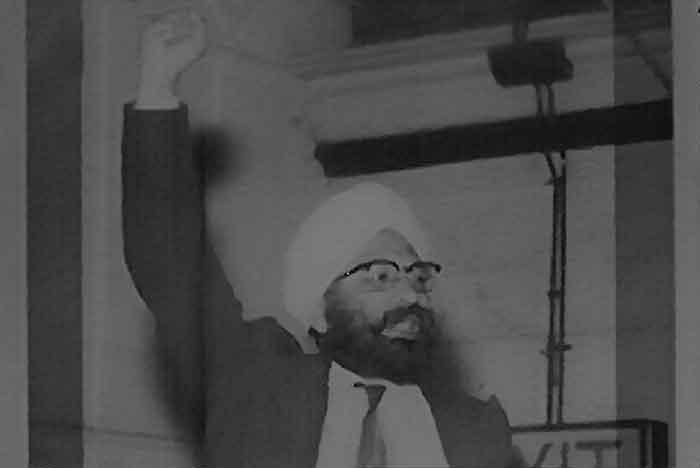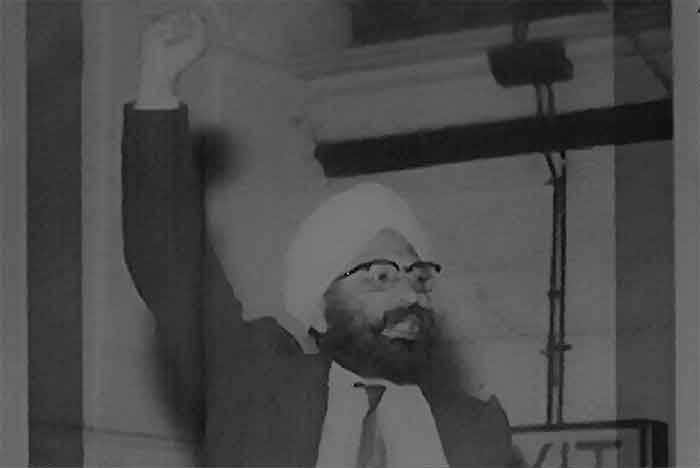
In 2006, I had an opportunity to visit Zanzibar, a fabled island in the Indian Ocean with which India has had commercial and cultural relations for hundreds of years. Zanzibar is a part of Tanzania where thousands of Indian Africans have lived since long. A few months before I landed in Zanzibar, an important book launch had taken place, first in Nairobi, capital of neighbouring Kenya, and later in Zanzibar. Unquiet : The Life and Times of Makhan Singh, a 563-page opus by writer and researcher Zarina Patel, seeks to rescue from oblivion the struggles and sacrifices of an Indian Kenyan belonging to the Sikh community who is credited by many, if not all Kenyans, with laying the foundations of the trade union movement in Kenya.
Makhan Singh would have been 105 had he been living today. This labour union leader was born on December 27, 1913, in Gharjakh village in the district of Gujranwala, now in Pakistan. He was 13 years of age when he moved with his family to Nairobi. He was a bright student but had to leave studies owing to financial difficulties and join his father in running Khalsa Printing Press, a small family business. In 1935, he formed the Labour Trade Union of Kenya and, in 1949, he and his friend Fred Kubai formed the East African Trade Union Congress, the first central organization of trade unions in Kenya. For his public expression of anti-colonialist views and his trade union activities, he was detained by the British rulers for ten years in the late 1950s in a desert prison camp in northern Kenya. He was released after a decade of confinement without any charge, or trial on October 20, 1961. Makhan Singh died of a heart attack in Nairobi at the age of 59. He is not widely remembered in Kenya and his name is almost unheard of in the country of his birth. But with the publication of Zarina Patel’s book, some people in Kenya and other parts of east Africa are at long last waking up to the life-long struggle by Makhan Singh to organize the working class and to fight for Kenyan independence.
Zarina Patel’s words bring alive a pioneer and a patriot who was already a forgotten man by the time he died : “Friends, relatives, and workers and a handful of trade unionists attended the funeral; there was no official government recognition of the passing of the great Kenyan patriot… Makhan Singh crossed the race barriers and brought together African and Asian workers on a common platform. This was British colonialism’s worst nightmare – the fusion of Indian political experience and the African mass struggle. So they detained him in Kenya’s Northern Frontier District and other places for a total of 15 years. They offered to release him on condition he left Kenya forever but Makhan Singh would not hear of it. Once, when his lawyers appealed for his release and, in order to elicit a favourable response, in their petition termed him as ‘this misguided man’, Makhan Singh objected strongly and retorted that it was not he, but the colonialists, who were misguided.”
At the book launch, Patel is reported to have mentioned the fact that those who ‘grabbed’ power after the British left, made it a point to distance themselves from those freedom-fighters who refused to rest and insisted on organizing new phases of the struggle for popular good. Patel : “Makhan Singh would not dance, he would only march, and soon he was out of step with the post-independent rulers. He was not alone. Pio Gama Pinto (whose forbears had migrated from Goa) was assassinated, Jaramogi Oginga Odinga was detained, Pranlal Sheth was deported and many other great stalwarts, including Bildad Kaggia, were sidelined. The calls for land reform, fairer distribution of wealth, and democracy for the majority did not sit well with the neo-colonial regime which had grabbed ‘independence’.” Many Indians would have little difficulty noticing the resemblances between what Patel writes and our own experiences post-1947.
If you speak to black Africans you will sometimes get the impression that they don’t like Indian settlers in Africa. They will mention the misdemeanours of Indian traders and businessmen but conveniently gloss over the contributions of the Asian community to their freedom struggles. The life of Makhan Singh, who lived and fought for the betterment of all races and adherents of all religions, is the answer to such accusations.
One has read or heard of how in the early decades of the last century, many Sikh workers engaged in laying railway lines in Kenya or Uganda would be dragged out of their tents at night by prowling beasts, not to mention lesser travails like ill-treatment by British employers. Their remains would be found later in nearby fields or bushes. In their own way, these migrant workers, many of whom never returned to their original homeland, shared the same pioneering zeal which drove Makhan Singh to a life of selfless service to Kenya. If black critics of real or imagined misdoings by the Asian community were to make an effort to remember the contributions of the early Sikh, Goan or Gujarati settlers to nation-building in Africa, perhaps a fairer and more comprehensive assessment of the issue would emerge.
One of Nelson Mandela’s claims to greatness is that he never failed to acknowledge the contribution of the Indian community in South Africa to the black struggle for independence. Unfortunately, a similar appreciation of historical truths was not shown in Kenya by many of the black leaders of the Mau Mau movement for freedom from British rule. Jomo Kenyatta could have certainly done more to place on record the many struggles of Indian Kenyan leaders against colonialism and imperialism.The people of Makhan Singh’s original country are to be accused of similar negligence. It is about time that the Indian people and the Indian Government raised a salute to this great Indian Kenyan.
(The author writes on public affairs, film and allied arts.)
SIGN UP FOR COUNTERCURRENTS DAILY NEWSLETTER








































